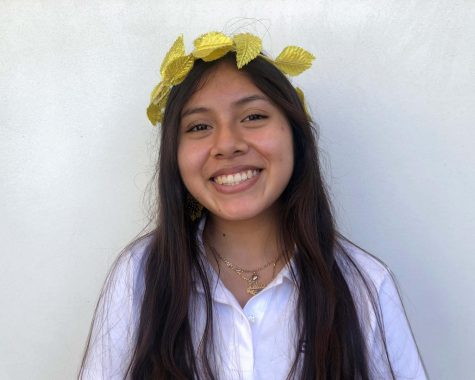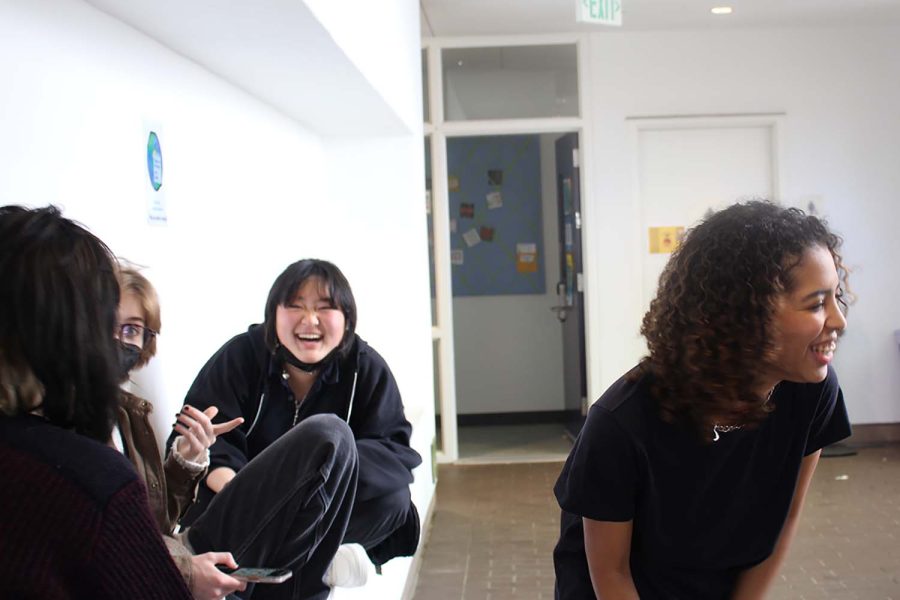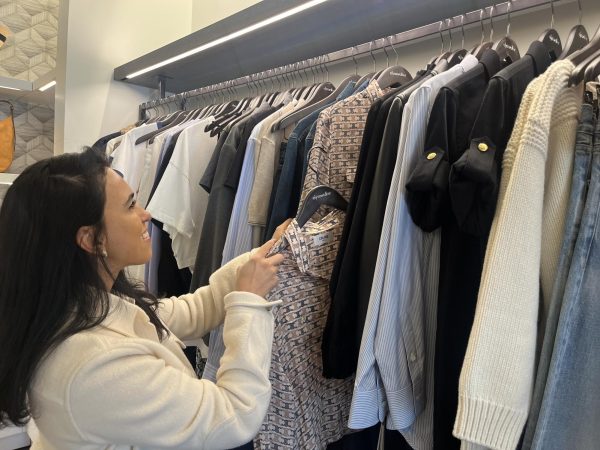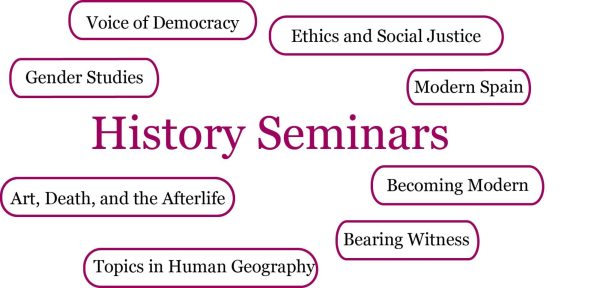‘In a room full of people, you might feel alone’: What does it mean to belong?
Photo credit: Jullie Cach
Sophomores Kayla Bruce, Audrey Chen, Maddie Lundberg and Sophie Paul laugh after their friend made a joke. Bruce said she was lucky to have found friends who care for her and are able to talk about anything.
Picture a girl learning about the new school life she is about to have. She walks into her new school slightly worried and nervous about not being able to fit in. She is worried about not knowing anyone while she watches other girls with their friends.
“It wasn’t until I moved schools that I realized how different my life was going to be,” sophomore Kayla Bruce said.
Bruce entered Archer in sixth grade not knowing any of her peers. Although everyone in her grade was new to the school as well, Bruce said there were many girls who already knew each other, and friend groups were already made. Bruce said that it was hard for her to open up to them.
“I entered sixth grade not knowing no one, and I had to build my friendships myself,” Bruce said. “It was incredibly difficult. In sixth grade, I gravitated towards people who shared the same language and ethnicity as me because I thought it was safer that way.”
In school communities, this sentiment of not belonging is a common feeling shared among new and returning students.
What is the definition of belonging?
Bruce is an example of people experiencing feelings of not belonging in a place like a school community. Therapist Lisa Tahir talks about the human nature of wanting to belong somewhere.
“We like to gravitate towards, for example, being someone important, especially in school, and to gravitate towards being in a certain clique that way we know we’re not exactly alone,” Tahir said. “Our connection to each other is the most important thing about being human. Though we appear to be physically separate energetically, we’re the same. We’re also connected and share some of the same deepest needs like belonging.”
According to the Cambridge dictionary, to belong is “to feel happy or comfortable in a situation.” Behavioral health, psychiatry and psychologist Angela Theisen wrote that the sense of belonging is human nature as people label themselves and others in categories. For example, people label themselves as being a part of a family, club, country, city, ethnicity or race. Theisen said the daily lives of humans are built on the foundation of belonging.
Tahir said it is important to have a space at school for students to connect with others emotionally and physically, whether it’s with adults or friends at school or through clubs.
“If the school would really promote an environment where students could talk to teachers, where teachers would be a person that students could talk to besides their academics and their classes, I think that would make the environment feel safer — feel more positive and encouraging,” Tahir said. “Not just teachers but also the open spaces such as clubs or student unions where students could connect with others and talk in safe groups to truly open up.”
At Archer, there are many clubs such as the Black Student Union, Hermanas Unidas and Asian Pacific Student Union where students can attend meetings to talk about their culture and have a safe place to be themselves and a way to build the foundation of their belonging.
Listen below to senior Justine Moore, sophomores Kayla Bruce and Emily Hernandez and sixth grader Ismarcis Ponce Cruz define what it means to belong in their own terms.
The Changing Nature of Belonging
According to Tahir, the feeling of belonging starts and builds from when infants are born. Infants crave the warmth and acceptance from their mothers, fathers and siblings to affirm the importance of their existence. As a child grows, the child takes into account the emotions of when they feel important and needed and when they don’t.
Tahir said as all infants grow up from children to teens and into an adult, what gives them the validation of their sense of belonging starts with their family, friends and other people around them asking them little questions and noticing details about them.

“Even though you might be in a room full of people, you might feel alone and lonely. It’s not necessarily just being next to someone else physically,” Tahir said. “It takes emotional connection and someone asking how you are and for them to listen to you so you feel that you are cared about. It’s just part of our makeup genetically and spiritually.”
According to Mayo Clinic Health System, studies have shown children who have not achieved a healthy childhood attachment within their family have lower self-esteem, a negative perspective of the world, are mistrustful and can have a perception of rejection.
Tahir said during people’s youth, they remember their emotions caused by the actions of classmates rather than the actions themselves. She said part of the brain registers these moments as an impression in the hippocampus, which releases neurochemicals causing feelings of anxiety and depression. In an article written by Judith E. Glaser, “neurochemical reactions within our brains drive our states of mind.” This affects communication in everyday relationships, breaking the trust with others.
Tahir gave an example of a time in a fitness class when nobody wanted her on their team for kickball. Since then, every time during fitness, she became more self-conscious about herself.
“That feeling of being unwanted makes an imprint in your memory. I started to feel nervous and anxious and not want to go because it was so painful to not be selected for a team and have the teacher have to put me on one,” Tahir said. “So, I think it really starts in those first experiences where we feel or we are rejected or judged and looked down upon.”
Similar to Tahir, Moore shared a similar moment of becoming self-conscious in her junior year when reading “The Autobiography of Malcolm X.”
“I had two other black students in my class, but it was really hard to read that book with my classmates because they would — it felt like they wouldn’t focus on the things I thought was important. I thought it would help if they knew these things maybe they didn’t see,” Moore said. ” I tried to share my perspectives, and I would try to read out specific quotations and say what I felt about them, but it didn’t seem like anyone was really listening. It was as if they were ignoring my perspective because it was kind of going in one ear and out the other.”
The experience of built-up neglect can cause self-awareness and lead to a change in social behaviors. Changes would be seen through their interactions with others and how they express themselves. Mayo Clinic Health System said this can cause someone to shut themselves out and lead to depression, anxiety and suicide.
How to increase our sense of belonging
In Mayo Clinic Health System’s article, the first step to having a sense of belonging is to make an effort to engage with peers and try to connect with them. Although people might connect with one another immediately, it takes time to build a strong connection and mutual trust between people. The article encouraged kids to be engaged, keep an open mind when joining new clubs, talk to new people, try new activities such as sports and more.
Sophomore Emily Hernandez said, at Archer, she was able to feel like she belonged due to the connection she made in clubs.
“Being able to join clubs and go to them weekly or every other week was very fun and helpful,” Hernandez said. “A club that truly help me branch was Hermanas Unidas, especially when we had our affinity meetings because I was able to share my culture and, in general, be myself.”
Hernandez also said that she is glad Archer has been able to showcase and help students learn about the many cultures girls would like to share.
“Before COVID, Diversity Day was a day we took time to learn about different cultures. I remember one year when these two this girl went up to present a dance to the whole school, and it was Folklorico which is a Mexican dance. Watching them perform made me feel proud of like my own culture,” Hernandez said. “Diversity day was only once a year, and, usually on that day, girls took this as an opportunity to not go to school because it wasn’t important or relevant to them. But now, Archer has been able to intertwine these different cultures into our class or all-school meetings which I’m glad about because now everyone can learn about different holidays.”
In addition, because the sense of belonging is mainly honed at school, Tahir said that if a student ever sees anyone who looks down and is in need of care, they should ask the person how are they doing and reach out and ask questions to reassure them they are wanted and important to others.
In psychologist Karen Hall’s article, “Create a Sense of Belonging,” the next step is to practice unconditional self-acceptance and self-love. She writes that recognizing one’s self is important because everyone has their own qualities, their own interests and passions. Similarities and difference are what builds bonding and relationships. Even if there are more differences between people, look for the mutual goal that is shared, and strive towards it. Hall adds that while practicing self-acceptance, avoid thinking negative thoughts as that brings oneself down.
Bruce applied this practice of self-love; She said the growth and self-acceptance she has gone through during her years at Archer have been helpful and have increased her sense of belonging.
“Although this adjustment may seem small, it was a pivotal moment in how I viewed myself. As I’ve learned and grown into my own self-acceptance, I’ve realized that standing out and being different isn’t always a bad thing,” Bruce said. “The only restrictions there are in this area are the boxes you put yourself in – I’m glad I don’t put myself in these boxes anymore.”

Jullie Cach is a staff reporter and joined The Oracle in 2021. She currently does choir, A Capella, and dance at Archer. In her free time you can find...








